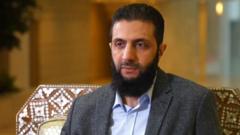The Biden administration has announced that Americans can now listen to speakers who are subject to U.S. sanctions, including members of groups such as Hamas and Hezbollah, at international conferences organized by American entities. This policy change has sparked discussions around free speech and counterterrorism laws.**
U.S. Policy Shift: Sanctioned Speakers Allowed in American-Organized Conferences**

U.S. Policy Shift: Sanctioned Speakers Allowed in American-Organized Conferences**
The Biden administration alters its stance on allowing Americans to engage with speakers under U.S. sanctions, reflecting a significant policy reversal amid ongoing tensions surrounding the Israel-Hamas conflict.**
The Biden administration has made a notable policy adjustment by permitting Americans to attend conferences featuring speakers who are under U.S. sanctions, specifically including members of Hamas and Hezbollah. This decision, confirmed through a letter to the court on November 12, reflects a shift in the national ethos, especially during a period characterized by tensions arising from ongoing conflicts involving Israel.
Legal expert Anna Diakun, associated with the Knight First Amendment Institute at Columbia University, commended this decision. The Knight Institute had previously challenging the U.S. Treasury's earlier prohibitions against allowing any sanctioned foreign speakers at American-supported events. Diakun emphasized that the First Amendment enshrines the rights of Americans to engage in dialogue with individuals from abroad, arguing that the government should not interfere with the exchange of ideas.
The core of the contention revolves around a U.S.-registered nonprofit—Foundation for Global Political Exchange. This organization facilitates platforms where American journalists, academics, and policymakers connect with local voices in regions across the Middle East and North Africa. This platform aims to foster rich discussions about regional political intricacies which could contribute to broader understandings of international relations and conflicts.
This recent decision could significantly influence the discourse surrounding free speech in the context of U.S. national security. As tensions continue with groups deemed terrorist organizations by U.S. authorities, the balance between national security, public sentiments, and the commitment to free expression has never been more crucial or contentious. The implications of this shift will likely reverberate throughout the discourse on U.S. foreign policy and domestic civil liberties.
Legal expert Anna Diakun, associated with the Knight First Amendment Institute at Columbia University, commended this decision. The Knight Institute had previously challenging the U.S. Treasury's earlier prohibitions against allowing any sanctioned foreign speakers at American-supported events. Diakun emphasized that the First Amendment enshrines the rights of Americans to engage in dialogue with individuals from abroad, arguing that the government should not interfere with the exchange of ideas.
The core of the contention revolves around a U.S.-registered nonprofit—Foundation for Global Political Exchange. This organization facilitates platforms where American journalists, academics, and policymakers connect with local voices in regions across the Middle East and North Africa. This platform aims to foster rich discussions about regional political intricacies which could contribute to broader understandings of international relations and conflicts.
This recent decision could significantly influence the discourse surrounding free speech in the context of U.S. national security. As tensions continue with groups deemed terrorist organizations by U.S. authorities, the balance between national security, public sentiments, and the commitment to free expression has never been more crucial or contentious. The implications of this shift will likely reverberate throughout the discourse on U.S. foreign policy and domestic civil liberties.



















